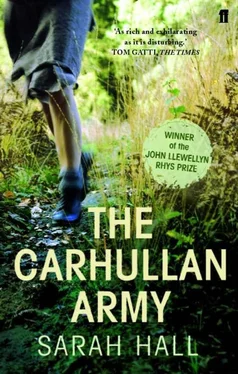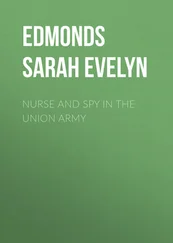Sarah Hall - The Carhullan Army
Здесь есть возможность читать онлайн «Sarah Hall - The Carhullan Army» весь текст электронной книги совершенно бесплатно (целиком полную версию без сокращений). В некоторых случаях можно слушать аудио, скачать через торрент в формате fb2 и присутствует краткое содержание. Год выпуска: 2008, Издательство: Faber and Faber, Жанр: Современная проза, на английском языке. Описание произведения, (предисловие) а так же отзывы посетителей доступны на портале библиотеки ЛибКат.
- Название:The Carhullan Army
- Автор:
- Издательство:Faber and Faber
- Жанр:
- Год:2008
- ISBN:нет данных
- Рейтинг книги:4 / 5. Голосов: 1
-
Избранное:Добавить в избранное
- Отзывы:
-
Ваша оценка:
- 80
- 1
- 2
- 3
- 4
- 5
The Carhullan Army: краткое содержание, описание и аннотация
Предлагаем к чтению аннотацию, описание, краткое содержание или предисловие (зависит от того, что написал сам автор книги «The Carhullan Army»). Если вы не нашли необходимую информацию о книге — напишите в комментариях, мы постараемся отыскать её.
The Carhullan Army — читать онлайн бесплатно полную книгу (весь текст) целиком
Ниже представлен текст книги, разбитый по страницам. Система сохранения места последней прочитанной страницы, позволяет с удобством читать онлайн бесплатно книгу «The Carhullan Army», без необходимости каждый раз заново искать на чём Вы остановились. Поставьте закладку, и сможете в любой момент перейти на страницу, на которой закончили чтение.
Интервал:
Закладка:
When Andrew arrived back he asked me if I was OK and if he could see it. We went inside, shut the door to our section of the building and I took down my trousers. I sat on the bed and he gently opened my legs. Everything felt inflamed. I had cleaned myself up with a towel after the procedure but the water would not be hot enough to wash properly until later that night. There was still some translucent medical jelly there. It glistened and felt almost unbearably slippery as Andrew ran his thumb over me. ‘How does it feel?’ he asked me again. ‘Is it uncomfortable?’ He was kneeling in front of me. I shrugged, shook my head and looked away. ‘You’re still you,’ he said. ‘Beautiful you. They can’t control that, can they?’ His thumb was rubbing me gently. I wanted to ask him to stop, it had been too traumatic, and there was still some blood, but neither one of us had ever said no to the other.
I felt him slip his middle finger inside me. He meant to do it slowly and carefully but the lubricant made his movement easy, and I heard him murmur a noise of surprise and arousal. My eyes were closed. ‘Is that nice?’ he asked me. There was the small wet sound of him drawing out and pushing his fingers in again.
His breathing changed, became thicker. ‘God. I’m sorry, I just want to be inside you,’ he said. ‘Can I? Will it make you forget it maybe? Come on. It’ll be just us.’ He leant forward to kiss me and unzipped his jeans. ‘Here, you,’ he said. He took my hand and put it to his groin. He was hard and as I gripped him I felt the blood straining underneath his tightened skin. He moved forward a little on his knees.
At the clinic we had been advised by the nurse to wait twenty-four hours. But after the hands of the doctor and the sharp bite of the tubing, any prohibition now seemed pointless. ‘Oh, God, yeah,’ he whispered as I pushed him inside, ‘it’s so wet.’ I could see in his face, the degree by which he felt the sensation more than usual. His mouth was open and his eyes seemed unfocused, with a pleading look.
As if still afraid it would be painful for me he didn’t move much, but there was a deep rawness to it all. He came quickly, and with more intensity than he ever had. As he pulled out I felt the warm fluid escaping onto my thighs. He held on to me, breathing hard, then his body jerked as if he was coming again. He put his thumb to me and began to rub, but I told him not to.
When the power came on he ran a bath for me and told the family in the room next door I would need a bit longer than usual. ‘Tough day,’ I heard him telling them. ‘She’s been at the clinic.’ For the rest of the night he was attentive, treating me with kindness, and he seemed happier than he had in months. It wasn’t to last.
The conditions were hard on all of us. Life changed in every way and it was difficult to adjust. There was despondency and resentment, food shortages, humiliations. Any small feeling of bliss, any cheap narcotic substance available to mask the difficulty, to make people forget what they once had, was easily sold. In the poorest quarters people took low-grade drugs, ketamine, and hits of silverflex, which rotted their jaws. They passed syphilis among themselves and the clinics cut tumours from the genitals of those who abused the animal tranquillisers for too long. There was almost no money, and what little there was seemed meaningless. People traded with their bodies, their possessions, they signed up for futurised loans.
This was not England, everyone said. This was some nightmarish version that we would wake from soon. The overdose and suicide rates climbed. Each time another occurred in Rith, and was talked about at the factories and plants, Andrew and I walked up the Beacon and held hands. It wouldn’t be us, we said. We were stronger. We’d come through OK.
But over the years I saw Andrew become weary and practical, reduced to the base mechanism of getting by. Or perhaps he simply lost faith and the energy to resist, realising how close we had all come to something far worse than the critical existence left to us. As time went by he became less outspoken. He no longer seemed lit by anger when talking about the recovery’s directives. Perhaps the government had done the only thing it could have to keep the country from breaking apart, he said, and I began to wonder what that early version of him had really consisted of. Meetings of opposition in the packed terraced houses concerned rather than excited him. The speakers were frauds and fantasists, he said, with no sense of financial solution, only contrary ideas and gripes. He didn’t want to get sick being around all those germs. He began not to attend. Instead he visited the bar near the castle, where the off-duty monitors drank.
He went to work, slept soundly through the night and reached for me in the mornings. Sex was one of the few remaining pleasures, he said; it was nice to feel me without any barriers. He ate the cubes of meat and fruit, from the shipments of tins sent from America, without complaint. After a while he began not to take small ritualistic pleasure in burning their labels in the old cast-iron fireplace of our quarter, as we had once done together. When he was promoted to overseer at the refinery he seemed grateful, and told me it was madness to be anything other than complicit in Britain’s attempts to rebuild herself. Once stability returned, so too would the freedoms we had lost. ‘We can be bitter,’ he said, ‘or we can just get on with it.’
When he’d said this I’d bitten my lip, and then turned to face him. Out of a deep place in me I’d felt my fury rise. ‘She’s a female, is she, this country that’s been fucked over?’ The cup I had been holding left my hand and I heard it explode with brittle force against the wall. He ducked, his eyes clenched shut, as the fragments showered him. Before he could recover from the shock, or answer, I had left the room, slamming the door behind me.
For months we bickered and sulked. Our conversations began to fail on even the smallest of levels. Who had not written tea on the monthly provisions list. Who had eaten the last vitamin tablet, the last omega supplement. Who didn’t understand the importance of this principle, or that political necessity. I knew he saw me as stubborn and naive, too upset to become empowered again. In bed he tried to negotiate, and have us agree physically, as if this would be the way we could still function together, as if I could separate my mind from my body and he could continue to communicate with one if not the other. ‘We could ask for anti-depressants,’ he said. ‘There are some coming over from America now and I could maybe swing something at work to pay for it.’
But he must have known at heart that I was not depressed. He must have known it was more than a simple chemical response to the ongoing situation. Mine was a different kind of sickness. I didn’t feel listless or oppressed. I didn’t want drugs or numbness to mask my consciousness. I knew that everything around me was wrong. I could see it. I could sense it. And I had not yet found a voice with which to make my arguments. It still lay somewhere inside me, unexpressed, growing angrier.
*
I scraped the last flakes of tuna out of the tin with my fingernail and finished the rusk biscuit. It was a dry meal and I had swallowed half the water from my canteen. It was all right to take so much fluid on board, I thought, even though I still had a long way to go; I would just refill the container from a stream when I was higher in the hills. This was always what I’d done when I’d hiked with my father, and I had loved the cold mineral rush against my lips. It had been years since I’d walked in the district but I could remember the taste, fresh, with the faint brine of limestone and moss.
Читать дальшеИнтервал:
Закладка:
Похожие книги на «The Carhullan Army»
Представляем Вашему вниманию похожие книги на «The Carhullan Army» списком для выбора. Мы отобрали схожую по названию и смыслу литературу в надежде предоставить читателям больше вариантов отыскать новые, интересные, ещё непрочитанные произведения.
Обсуждение, отзывы о книге «The Carhullan Army» и просто собственные мнения читателей. Оставьте ваши комментарии, напишите, что Вы думаете о произведении, его смысле или главных героях. Укажите что конкретно понравилось, а что нет, и почему Вы так считаете.












